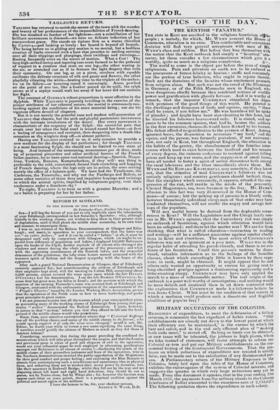TOPICS OF THE DAY.
THE KENTISH "FANATICS."
THE riots in Kent are ascribed to the religious fanaticism ofIthe people ; a malady, for which, Mr. WYNN assured the House or Commons, education is no cure. This comfortable and convenient doctrine will find very general acceptance with men of Mr. WYNN'S class and calibre. But before they hug themselves with the notion that the Kent outbreak had simply a "fanatical" cha- racter, let them consider a few circumstances which give it a worldly, quite as much as a religious complexion. W.7a
The world- to come is the object put before the eves of simple religionists. Pain and privation on earth are to be endured as the precursors of future felicity in heaven : scoffs and contumely are the portion of true believers, who ought to rejoice therm. Such are the doctrines of the fanatics whose excitement proceeds from religion alone. But such was not the creed of the Illuminati in Germany, or of the Fifth Monarchy men in England, who were dangerous chiefly because they combined notions of worldly power and gratification with ghostly fervour. And it is worthy of remark, that the impostor COURTENAY stimulated his dupes with promises of the good things of this world. He pointed to the dwellings and demesnes of lords and squires, saying, " these shall be yours, if you follow me." He was harmless till he spoke of plunder ; and might have been star-shooting to this hour, had he directed his followers heavenward only. It is stated, and ap- pears to be the common opinion, that had he beaten the soldiery in the first encounter, thousands would have flocked to his banner. His defeat afforded no gratification to the yeomen of Kent. Among ignorant boors, the disposition to reverence "my lord," and the squire, and the parson, was formerly prevalent, if not universal: now, not only in Kent, but throughout England, the alteration in the habits of the gentry, the abandonment of the familiar inter- course which used to exist between the landlord and his tenants of every degree, the ruinous endeavour to contend against falling prices and keep up war rents, and the suppression of small farms, have all tended to foster a spirit of sullen discontent both among the rural labourers and the class immediately above them. Mr. WYNN and Sir EDWARD KNATCHRULL may ascertain, if they know not, that the stimulus of mad COURTENAY'S followers was not entirely religious : and country gentlemen should bethink them, that the slaughter which necessarily, it uppears, attended the sup- pression of the riot, will rankle in the minds of the peasantry. Clerical Magistrates, too, were foremost in the fray. Mr. Hums's allusion to this fact was very ill-received in the House of Com- mons—of course ; but the mixing up of parsons in a bloody strife, however blamelessly individual clergy men of that order may have conducted themselves, will not soothe the angry and savage feel- ings of the populace.
Will any useful lesson be derived from the deplorable occur- rences in Kent? Will the Legislature and the Clergy lazily con- cur in Mr. WYNN'S opinion, that the Canterbury riot was simply an outbreak of fanaticism, against which education would have
been no safeguard; and there let the matter rest ? We are far from thinking that what is called education—instruction in reading and writing—will be a sufficient guarantee against similar ebulli- tions in Kent and elsewhere. The most active of COURTENAVS followers was not an ignorant or a pour man. W ILIA was in the regular habit of attending his parish-church, and there is no evi- dence of his fanaticism. Could this person's motives be disco- vered, valuable information as to the feelings of the humbler classes, about which exceedingly little is known by their supe- riors in rank, might be obtained. It might appear that he and others only wanted an opportunity or excuse for giving vent to long-cherished grudges against a domineering squirearchy and a tithe-exacting clergy. COURTENAY may have only applied the match to a mass of inflammable matter. The real origin of the outbreak is a point well worthy of investigation ; and nothing would be more doltish and irrational than to sit down contented with the explanation that COURTENAY made Ii s followers believe he was Jesus Christ. W hat must be the condition of that society in which a madman could produce such a disastrous and frightful ebullition of popular fury !


























 Previous page
Previous page